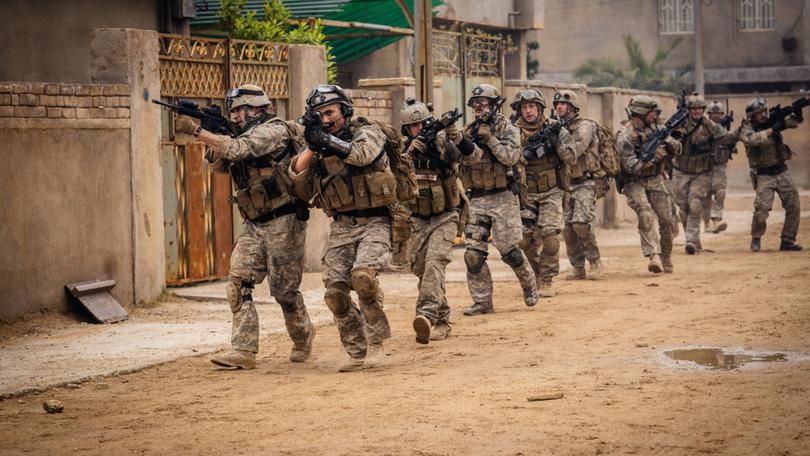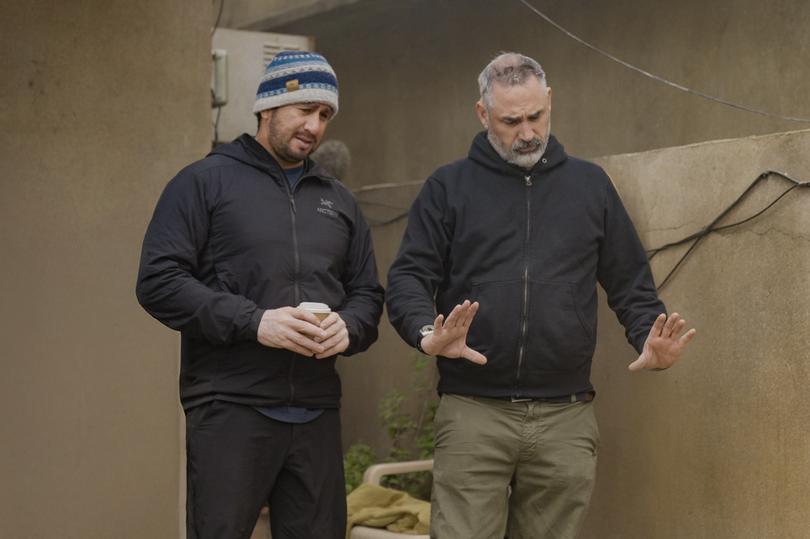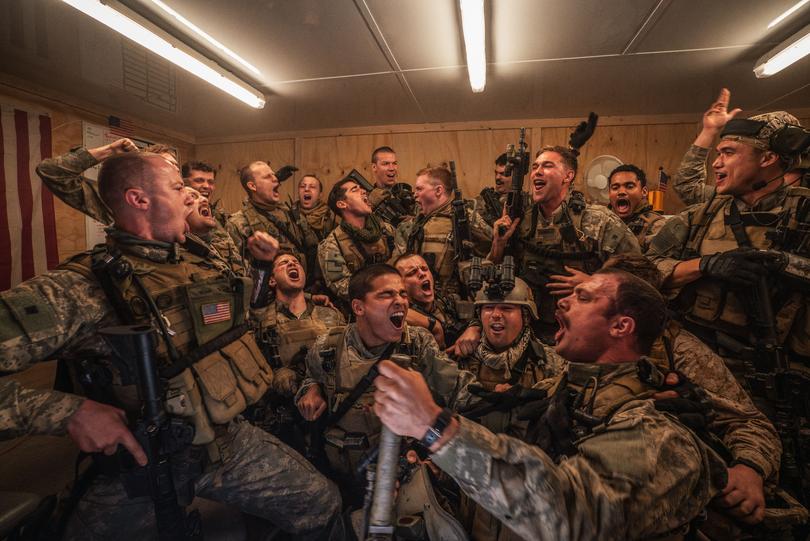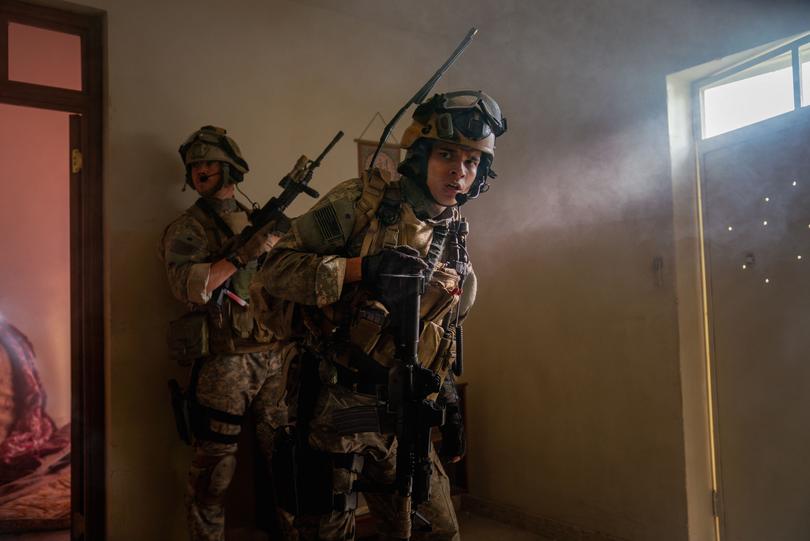Warfare film: Alex Garland, Ray Mendoza and D’Pharoah Woon-A-Tai on brutal, hyper-real recreation
When it comes to military combat, can a hyper-real screen depiction ever be neutral?

Warfare is brutal. It’s vicious, it’s chaotic and it’s merciless.
Those descriptors apply to both actual military conflict and the film written and directed by Alex Garland and Ray Mendoza.
The film is a visceral gut-punch, a hyper-realistic recreation of a 2006 American operation in which a Navy SEAL team found themselves pinned down in a residential area in Ramadi, exchanging gunfire with insurgents and desperate to be extracted.
Sign up to The Nightly's newsletters.
Get the first look at the digital newspaper, curated daily stories and breaking headlines delivered to your inbox.
By continuing you agree to our Terms and Privacy Policy.It runs for 95 minutes and most of it plays out as one real-time sequence, which means the audience is given no time to breathe just as the characters have no reprieve. Unlike traditional Hollywood war films, there is no musical score, merely the drumbeat rhythms of gunfire and the piercing screams of severely wounded soldiers.
Told entirely from the perspective of the teams on the ground, the film was built from the recollection of Mendoza and his fellow soldiers, patched together from their trauma-laced memories.

Mendoza had been working as technical adviser on film and TV productions since 2016, bringing to those projects his experiences in the armed forces. It was on Garland’s previous film, Civil War, when Garland asked Mendoza if there was a story he wanted to tell.
Mendoza wanted to do the story of this Ramadi operation, in large part because his compatriot, Elliott Miller, has no memory of that day. “The reason I wanted to make this film was to recreate it for him,” Mendoza said.
Garland and Mendoza were aiming for “accuracy”, “honesty” and “truthfulness”, but those are loaded words and complex in ambition. A film that depicts in harrowing detail the experiences of a combat unit will always be one-sided. But neutrality doesn’t have to mean duelling perspectives.
“Cinema has a very long and complicated history with war films, and there are so many that it’s a genre,” Garland said.
“Many of those films are very distorting in one way or another, and that’s not to say they’re not valid or they don’t have a place. But it is important at times to also present an account that is as truthful as it can be.
“There is an inherent value in honesty. In honesty, that is not coming with an agenda. It’s simply trying to say this is what happened, and then that becomes reliable information from which other people can form their own opinions about the rights or wrongs of things.”

The filmmakers chose not to show the enemy insurgents as little more than blurry figures in the distance. As Garland argued, in combat, you cannot clearly see who’s coming at you, and the film, by its own terms, can only portray what its characters experienced.
“We were trying to show what combat is actually like, which is not clear views in that way. The experience of the soldiers is more claustrophobic and locked down than that.”
For the ensemble cast, Garland and Mendoza cast a cavalry of young actors on the rise including Will Poulter, Cosmo Jarvis, Joseph Quinn, Charles Melton, Michael Gandolfini and Kit Connor. The person who had the responsibility of being Mendoza’s stand-in on screen was D’Pharaoh Woon-A-Tai, a Canadian actor who was Emmy-nominated for his performance in the under-appreciated but superb Reservation Dogs.
Woon-A-Tai nabbed the role in part because he turned up 20 minutes early to the meeting with the filmmakers. “We barely chatted about the project, but me and Ray, we were more discussing our upbringing and just who we were. I could tell he was trying to sense out who I was as a person,” he told The Nightly.
He and his colleagues spent three and a half weeks in military bootcamp, learning exercises, simulations, weapons training, gun safety and more. They also used that time to block the complex scenes which involved takes that ran for up to 20 minutes.

“We did rehearsal after rehearsal,” Woon-A-Tai recalled. “It felt very much like a play. I’m not a theatre kid, I didn’t grow up in theatre, I really hope to do one, one day, but I feel like that was my first exposure to theatre.”
When it came to shooting the long scenes with all those actors in cramped spaces, Woon-A-Tai said the camera operators were amazing, and filmed almost everything on handhelds.
“They’re just gliding through the whole scene, capturing different reactions, and as actors, we never know who’s on and who’s off camera, so that meant every single person in that room was always 110 per cent on.”
For Mendoza, being on a set that had faithfully recreated one of the most traumatic experiences of his military career triggered something in him.
“There are some scenes in the movie that brought up some emotions that I had compartmentalised for a long time, and that’s not healthy to keep in there for 20 years.
“I experienced that with Elliott, who was on set, and we went through it together because he has a lot of questions and we had an emotional moment. He cried, I cried, and it was a very healthy, therapeutic closure to that chapter,” he said.
When Garland’s Civil War was released last year, the British filmmaker had been criticised for not identifying the political stripes of each side of the combatants in the film about conflict in the US. Some had said it was irresponsible to be apolitical at a time with heightened division in the real world.
But non-partisan is not apolitical. Just as “neutral” is not apolitical or non-political. Arguably, all war films are political, as is the choice to make one.
“We live in an environment where people are reluctant to present things neutrally for one reason or another, you actually get attacked when you present things neutrally,” Garland said.
He added, “This idea that by presenting a real sequence of events in a neutral way, you are non-political, is a mistake. It misunderstands the nature of politics. In current jargon, politics means you are polarised left or polarised right, and it’s not a position I agree with.”
Neutrality also doesn’t mean you’re not making a judgment on the ethics of war itself. At the film’s premiere, Poulter called the film anti-war, but it may invite other perspectives. It doesn’t contain “traditional” images of heroism in combat but it certainly emphasises the camaraderie in these military cultures.
“We didn’t want you to feel a certain way,” Woon-A-Tai said. “If you felt however you felt going into it and leaving it, that’s just how you are.
“Do I think this film is pro-war? If Ray and Alex say they took a neutral stance, then they’re the writers.
“But, let me tell you, when I left this project, it didn’t make me want to join the military.”
Warfare is in cinemas on April 17

